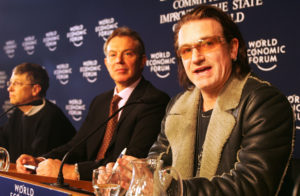The World Health Organization had a terrible pandemic. Continually lambasted for its role in the public health disaster, only last week another embarrassment landed: the lab leak hypothesis, which it relentlessly tried to knock down, was accepted as the most likely explanation for the coronavirus.
The body tasked with the protection of public health, however, is undaunted by the criticism. We now learn it is engaged in a silent coup that, if successful, would grant it even more sweeping powers of intervention in the affairs of nation-states.
When it was created, after World War II, as an agency of the United Nations, it had the aim of promoting “the enjoyment of the highest attainable standard of health” across the globe — whereby health was understood, crucially, as “a state of complete physical, mental and social well-being and not merely the absence of disease or infirmity”. It was, in other words, predicated on an understanding of the fact that economic and social development are fundamental determinants of health — a concept that would be reaffirmed in the Declaration of Alma-Ata of 1978.
As a reaction to the brutality of 20th-century totalitarian and colonial regimes — both of which had involved horrendous cases of medical abuse — the WHO also emphasised the importance of democratising medicine by putting communities and individuals in charge of their health through the promotion of proximity and primary healthcare. Under this democratic and rights-based framework, the WHO achieved several notable achievements, most notably the eradication of smallpox.
However, from the Eighties onwards, things started to change. Until then, the organisation had relied on the contributions of its member states for its regular budget. In 1982, however, the World Health Assembly, the WHO’s decision-making body, voted to freeze its budget — under pressure from the Reagan administration, which saw the WHO as a socialist-leaning, unaccountable organisation working against American interests. This was followed by the 1985 decision by the United States to withhold its contribution, in part as a protest against its “Essential Drug Program”, which encouraged developing countries to develop their own capacities to produce essential medicines, rather than rely on Western drug companies — small wonder leading US-based pharmaceutical companies were averse.
As a result, the organisation was forced to rely increasingly on extrabudgetary funds provided by “stakeholders”: not only governments and bilateral and multilateral agencies (such as the World Bank), but private and corporate donors as well, including pharmaceutical giants such as GlaxoSmithKline and Novartis. Over the years, among the private extrabudgetary donors, the Bill & Melinda Gates Foundation rose above the rest: by the 2010s, it had become the WHO’s second-largest donor, accounting for around 10% of all funds.
Since voluntary contributions are earmarked, the donors largely get to call the shots on the use of the funds they contribute, as Margaret Chan, the WHO’s former Director-General, complained a few years back. This has led to the proliferation of public-private programmes more or less independent of the rest of the WHO’s programmes and decision-making structure, such as the Children’s Vaccine Initiative.
“The priorities of WHO have evolved accordingly, moving away from community-centred care to a more vertical, commodity-based approach”, writes David Bell, a public health physician and former WHO staffer specialising in epidemic policy. “This inevitably follows the interests and self-interests of these funders.” In place of the preventative and “holistic” approach to health initially championed by the WHO, which viewed health as the outcome of a wide range of economic, social and political factors, a new paradigm has slowly emerged: a commercialised approach to health, single-mindedly focused on high-tech, largely vaccine-based solutions, with a particular interest for genetically engineered biotechnologies — an emerging industry potentially worth billions of dollars.
A crucial role in this shift was played by Bill Gates. As the WHO’s second-largest funder, Gates exercises a massive influence over the organisation, as even admirers of the foundation admit. And he has used that influence to promote vaccine-driven responses to matters of global health — through the WHO as well as through related public-private partnerships such as GAVI (Vaccine Alliance) and CEPI, also funded by Gates. In 2011, Gates spoke at the WHO, and declared: “All 193 member states [must] make vaccines a central focus of their health systems”. The following year, the World Health Assembly adopted a “Global Vaccine Plan” that the Gates Foundation co-authored, and over half of the WHO’s total budget now goes to vaccines.
His obsession with vaccines really shouldn’t come as a surprise. The Gates Foundation is strongly connected to the pharmaceutical industry, and ever since its creation, it has owned stakes in several drug companies. The foundation’s website even candidly declares a mission to pursue “mutually beneficial opportunities” with vaccine manufacturers. This is the essence of what has been called philanthrocapitalism — “a capitalist, market-based, for-profit approach to solving the world’s biggest and most pressing issues”. This kind of corporate-driven approach exemplifies the conflicts of interest inherent in the WHO’s dependence on unaccountable private donors such as the Gates Foundation.
Some activists in the Global South have especially negative views of the consequences for public health. A leading human rights activist in India, Vandana Shiva, said: “Gates has hijacked the WHO and transformed it into an instrument of personal power that he wields for the cynical purpose of increasing pharmaceutical profits. He has single-handedly destroyed the infrastructure of public health globally.”
Meanwhile, Linsey McGoey, a professor of sociology at the University of Essex, explains in her book No Such Thing as a Free Gift: The Gates Foundation and the Price of Philanthropy how Gates has used his influence over the WHO to defend the intellectual property rights of drugs manufacturers.
Crucially, just as the WHO was falling increasingly under the dominion of private capital (and Gates in particular) the organisation also started expanding its power. A key step was the third revision of its International Health Regulations (IHR) in 2005, on the heels of the 2002-2004 SARS outbreak, which for the first time made the agreements, encompassing a wide range of rules for the management of epidemics and pandemics, binding for all member states (even though the latter remained formally in charge of health policies).
This coincided with a wider push towards the supranationalisation of health policies, with the transition from “international” to “global” public health. While the two terms may appear synonymous, they in fact indicate two very different systems: while the former is grounded in nation-states as the ultimate repositories of authority, the latter implies that governments are just one (and not even the most crucial) component of a global health system involving a wide range of “stakeholders” — for example the media, private institutions and multinational corporations — with the WHO at its core as the ultimate voice of authority. This gradually inverted the relationship between the WHO and member states: as the latter’s influence over the organisation was increasingly eclipsed by private interests, the WHO’s influence over member states was growing.
This has led, over the past two decades, to the burgeoning of a massive global health industry encompassing the world’s largest pharma and biotech companies, global and national public health organisations (first and foremost the WHO itself), private philanthropies such as the Gates Foundation, vaccine-focused public-private partnerships such as GAVI and CEPI, and trans-Atlantic planning groups-cum-think tanks such as the World Economic Forum as important intermediaries between the various actors. These actors clearly have interests independent of each other, but over the years such interests have come to coalesce over the need to prepare for, and the profit opportunities offered by, future pandemics — deemed to be all but inevitable.
Indeed, the pandemic shone a light on the power accrued by the global health industry in the years leading up to 2020 — and its influence over the WHO. As Covid took hold, the organisation jettisoned its years-long established position on pandemic management, along with any form of evidence-based science, in favour of a completely novel pro-lockdown and vaccine-centric narrative — the same approach championed, among others, by its main private donor, Bill Gates, who, Politico suggested, used his clout to “control the global Covid response”. As one civil society group stated, the WHO effectively “outsourced” the management of the global Covid vaccine rollout to Gates.
The WHO, for example, played a crucial role in the cover-up of the lab leak hypothesis. It also jettisoned its 2019 pandemic plan (which didn’t mention “lockdown” once) to embrace and promote Chinese-style lockdowns. Such was its praise and defence of China, it was criticised for appeasement. It stoked panic by claiming Covid was much deadlier than it was already known to be. It ignored known age-stratified risk. It promoted test-and-tracing, even though it had previously claimed that “under no circumstances”, however severe the outbreak, should contact tracing be adopted, due to its limited effectiveness, but also due to “ethical concerns”.
It promoted universal masking, even though it had acknowledged early on that there was no evidence of its benefits. It negated the benefits of natural immunity in order to promote the claim that herd immunity could only be achieved through vaccination. It refused to acknowledge (until April 2021) that SARS‑CoV‑2 is airborne, despite ample evidence of the contrary. And it promoted the censorship of factually true claims relating to all of the above under the guise of fighting disinformation — and actually promoted misinformation and disinformation itself.
All this points to a colossal failing on the WHO’s behalf. On the one hand, it highlights the risks inherent in a top-down, highly centralised and bureaucratised approach to public health — the opposite of the democratic, community-based, bottom-up approach initially championed by the WHO. On the other, however, it is also a stark reminder of what happens when an institution becomes captured by private interests. So why are plans underway to hand the WHO even more power?
This is the aim of two agreements currently under discussion. The first consists of a set of amendments to the existing International Health Regulations, an instrument with force under international law. The second is a new “pandemic treaty” that goes in the same direction as the IHR amendments.
The IHR amendments are at a much more advanced stage, and have a much greater chance of being approved — the modifications will effectively carry the same weight as a new treaty, but are much less contentious than the proposed “treaty” and only require the approval of 50% of countries to come into force. The consequences would be far-reaching. These amendments, as Bell writes, “are intended to fundamentally change the relationship between individuals, their countries’ governments, and WHO”.
In terms of individual rights, the WHO propose to abandon, even formally, the WHO’s anchoring to the Universal Declaration of Human Rights, by suggesting that the phrase stating that the regulations will be implemented “with full respect for the dignity, human rights and fundamental freedoms of persons” be deleted from the text and replaced with the vague terms “equity, coherence, inclusivity”. In terms of the relationship between member states and the WHO, the amendments aim to give the WHO authority over states, by proposing to change the definition of “recommendations” from “non-binding” to (by deletion) “binding”, and specifying that states will undertake to “follow” (rather than “consider”) the recommendations of WHO. The latter may include: vaccine mandates, measures requiring proof of vaccination (vaccine passports), quarantining of individuals (lockdown), travel restrictions and all manner of health interventions.
Moreover, an entire new article is proposed where states “recognize WHO as the guidance and coordinating authority of international public health response during public health Emergency of International Concern”. This is of particular concern if considered in tandem with another amendment which widens the definition of what constitutes a public health emergency to include “all risks with a potential to impact public health”, and assigns to the Director-General — today, Tedros Adhanom Ghebreyesus — the sole authority to declare an emergency. It’s hard to see how anyone could consider putting so much power into the hands of a single person a good idea, especially in view of Ghebreyesus’s flawed response to the pandemic.
We should be very concerned about the power grab being attempted by the WHO — especially since it’s happening without any public debate whatsoever. It would be concerning even if the organisation had maintained its original funding model, institutional structure and underlying philosophy. But it’s particularly concerning if we consider that the WHO has fallen largely under the control of private capital and other vested interests. It would mark the definitive transformation of global health into an authoritarian, corporate-driven, techno-centric affair — and risk making the Covid response a blueprint for the future rather than a disaster which should never be repeated.
Disclaimer
Some of the posts we share are controversial and we do not necessarily agree with them in the whole extend. Sometimes we agree with the content or part of it but we do not agree with the narration or language. Nevertheless we find them somehow interesting, valuable and/or informative or we share them, because we strongly believe in freedom of speech, free press and journalism. We strongly encourage you to have a critical approach to all the content, do your own research and analysis to build your own opinion.
We would be glad to have your feedback.
Source: UnHerd Read the original article here: https://unherd.com/




